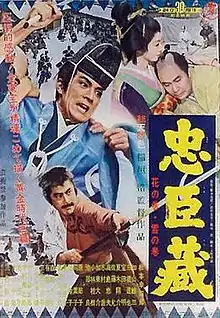Chūshingura: Hana no Maki, Yuki no Maki
Chūshingura: Hana no Maki, Yuki no Maki (忠臣蔵 花の巻 雪の巻, Chushingura: Story of Flower, Story of Snow) is a 1962 Japanese period drama film (jidaigeki) directed by Hiroshi Inagaki, produced by Tomoyuki Tanaka, Sanezumi Fujimoto, and Inagaki. Produced and distributed by Toho Studios, it is based on the story of the forty-seven rōnin. The film stars Toshiro Mifune as Genba Tawaraboshi, along with Matsumoto Hakuō I, Yūzō Kayama, Tatsuya Mihashi, Akira Takarada, Yosuke Natsuki, Makoto Satō, and Tadao Takashima.[2]
| Chūshingura: Hana no Maki, Yuki no Maki | |
|---|---|
 Japanese film poster | |
| Directed by | Hiroshi Inagaki |
| Produced by | |
| Screenplay by | Toshio Yasumi[1] |
| Based on | |
| Starring | |
| Music by | Akira Ifukube[1] |
| Cinematography | Kazuo Yamada[1] |
| Edited by | Hirokazu Iwashita[1] |
Production company | |
| Distributed by | Toho |
Release date |
|
Running time | 208 minutes[1] |
| Country | Japan |
Chūshingura: Hana no Maki, Yuki no Maki was released theatrically in Japan on 3 November 1962.[3] It was released under the title 47 Samurai in the United States.
Plot
The ruling shōgun Tokugawa Tsunayoshi placed Asano Takumi-no-kami Naganori, the daimyō of Akō, in charge of a reception of envoys from the Imperial Court in Kyoto. He also appointed the protocol official (kōke) Kira Kōzuke-no-suke Yoshinaka to instruct Asano in the ceremonies. Asano is young and idealistic and does not understand various court protocols accepted in mediaeval Japan concerning the back-and-forth payments of officials for larger and lesser favors. Asano only sees these payments as a corrupt form of hand-outs and, worse in his idealistic perspective, as a corruption of government and it just operation. Asano decides to boycott the payment of any 'tithes' to anyone for any reason. Kira is instructed to take notice of this and decides to teach the young Asano a lesson in manners and customs by withholding commonly expected courtesies to rebuke him. Kira is hoping that Asano will become part of the 'tithing' expectations of government officials in the Tokugawa realm.
These 'tithing' expectations weigh heavily on the young Asano, and the intentional withdrawal of common courtesies from him by court officials make him emotionally agitated and unstable. On the day of the reception, at Edo Castle, Asano draws his short sword and attempts to kill Kira. His reasoning appears to lack all decorum of court, but many purport that an insult may have provoked him. For this act, he is sentenced to commit seppuku, but Kira does not receive any punishment. The shogunate confiscates Asano's lands (the Akō Domain) and dismisses all the samurai who had served him, making them rōnin. When their lord is forced to commit ritual suicide, forty-seven of his samurai await the chance to avenge their master and reclaim their honor.
Cast
- Matsumoto Hakuō I as Chamberlain Ōishi Kuranosuke
- Yūzō Kayama as Lord Asano Naganori
- Tatsuya Mihashi as Horibe Yasubei
- Akira Takarada as Takada Gunbee
- Yosuke Natsuki as Okano Kin'emon
- Makoto Satō as Fuwa Kazuemon
- Tadao Takashima as Jūjirō Hazama
- Toshiro Mifune as Genba Tawaraboshi
- Chūsha Ichikawa as Lord Kira Yoshinaka
- Akira Kubo as Lord Date
- Takashi Shimura as Hyōbu Chisaka
- Daisuke Katō as Kichiemon Terasaka
- Keiju Kobayashi as Awajinokami Wakisaka
- Ryō Ikebe as Chikara Tsuchiya
- Setsuko Hara as Riku
- Yoko Tsukasa as Yōzen'in
- Reiko Dan as Okaru
- Yuriko Hoshi as Otsuya
Production
Film critic and historian Stuart Galbraith IV wrote that the film featured "complex billing" which featured "virtually everyone under contract to [Toho] at this time.".[4] The film was shot in Eastmancolor.[1]
Release
Chushingura was distributed by Toho in Japan on November 3, 1962.[1] The film was Toho's fourth highest-grossing film of 1962 and was the 10th highest-grossing film in Japan that year.[4]
The film was released by Toho International with English subtitles and an English narration by Michael Higgins with a 108-minute running time on October 10, 1963.[1][4] This version was later cut to 100 minutes for its release in New York.[4] In 1965, the Berkeley Cinema Guild acquired the distribution rights to the film and showed the full version (in two parts), under the title 47 Ronin, at the Cinema Theatre in Berkeley, California for 41 weeks before distributing the film in New York.[5] It was reissued in 1966 with a 207-minute running time in the United States.[4] It was later re-issued by East-West Classics with subtitles at a 208-minute running time.[4]
References
Footnotes
- Galbraith IV 2008, p. 196.
- "忠臣蔵 花の巻 雪の巻". 衛星劇場. Retrieved 27 December 2020.
- "忠臣蔵 花の巻 雪の巻". Kinema Junpo. Retrieved 27 December 2020.
- Galbraith IV 2008, p. 197.
- "Landberg Serves Samurai Buffs Full '47 Ronin'". Variety. 6 October 1965. p. 15.
Sources
- Galbraith IV, Stuart (2008). The Toho Studios Story: A History and Complete Filmography. Scarecrow Press. ISBN 978-1461673743.CS1 maint: ref=harv (link)